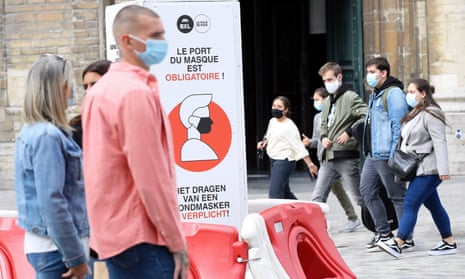Belgium is losing control of the second wave of the coronavirus pandemic and is very close to being overwhelmed by a “tsunami” of infection, the country’s health minister has said.
Frank Vandenbroucke, the federal minister, told the broadcaster RTL that Belgians needed to radically alter their behaviour.
He described the situation in Francophone Wallonia in the south and in the country’s capital, Brussels, as “the worst, and therefore the most dangerous in all of Europe”.
He said: “We are the most affected region in all of Europe. We are really close to a tsunami … that we no longer control what is happening. Today, we can still control what is happening, but with enormous difficulties and stress.
“If it continues to increase, the number of hospitalisations will be such that we will have to postpone more and more non-Covid care, which is also very dangerous. [The government] has only one message to the public: protect yourself, protect your loved ones, so as not to be contaminated.”
Belgium had been cited by the UK health secretary, Matt Hancock, only last month as a model of how to deal with the second-wave of infections, after numbers were kept down in August.
Hancock had suggested that the Belgian policy of limiting people’s interactions within small “social bubbles” had been effective as he sought to convince the British public of the utility of the ‘rule of six’ in the UK.
The numbers in Belgium have, however, shot up since September, as adults returned to work and pupils went back to school after their summer break.
Between 9 and 15 October, an average of 7,876 new infections a day were reported, an increase of 79% from the previous week.
Last Tuesday, 12,051 infections with the corona virus had been identified, marking the “highest number of infections recorded in one day since the start of the pandemic,” said Dr Steven Van Gucht, the spokesman for the Belgian virus Crisis Centre, at a press conference on Monday. “We also passed the 10,000 infection mark on Wednesday, October 14, with 10,932 confirmed cases in one day.”
The Belgian government’s latest restrictions came into force on Monday, including yet another squeezing of the number of people allowed in the social bubbles, as the government made an eleventh hour attempt to avoid another full lock down.
Only one “close contact” outside a household is allowed. Four guests, changeable every two weeks, may visit homes if they keep a distance.
For four weeks from Monday, all bars and restaurants will also be closed. The sale of alcohol will be banned after 8pm and a curfew will be imposed between midnight and 5am.
The new Belgian prime minister, Alexander De Croo, had said on Friday the situation facing the country was “more serious” than it had been in March before the first nationwide lockdown.
Behind-the-scenes the government had been torn over how to respond to the spiralling number of infections. But Vandenbroucke, with the prime minister’s support, ultimately convinced sceptics in the government that social contacts in the hospitality sector had been fuelling the crisis.
“The main thing is people’s behaviour,” Vandenbroucke said. “They must understand that they must protect themselves and their loved ones, therefore respect the distance, wear the mask if there is no distance, limit the number of contacts… This is essential. I can only repeat: the virus is no one’s fault, so let’s not make one or the other feel guilty. But now, rectifying this situation is everyone’s responsibility.”
The government has also faced criticism over its track and trace system with the sheer number of people seeking a test causing delays in results being provided.
The mayor of Namur, Maxime Prévot, said: “There is clearly a problem today in terms of testing, and even more so in terms of tracing. We do not have effective monitoring. We have kilometres of lines [of people] to be tested, then we wait days and days to have the results.”
The Walloon minister of health, Christie Morreale, admitted that the system was under unprecedented strain. “The laboratories are working at full speed. And Belgium is one of the EU countries which tests the most, But at some point, when there are too many patients, the system cracks.”
Between 11 and 17 October there were an average of 233.9 daily admissions to hospital, a 96% increase on the previous week.
